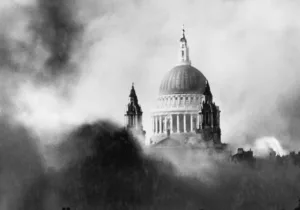Is authoritarianism instead of democracy sometimes needed to “shield” the nation? So thought Marshal Philippe Petain, who, with widespread support, led France’s collaborationist Vichy regime during World War II. Julian Jackson’s France on Trial masterfully and disturbingly examines Petain’s post-war treason trial. It exposes countless moral ambiguities about statecraft, political responsibility, legitimacy, and nationhood.
Petain was the aged World War I hero to whom defeated France turned after Germany’s stunning 1940 victory. Some in parliament thought Petain would revive national morale to resist Germany. But Petain, like most others, thought further resistance was futile. Such was French malaise that parliament appointed Petain dictator by a remarkable 569-80 vote. Among the heroes of “The Eighty” were former Socialist Prime Minister Leon Blum, who was Jewish and would later suffer in a German camp but survive to testify in Petain’s trial. Northern France, with Paris, was directly occupied by Germany. Petain presided over southern France, on a sometimes-tight German leash. Germany used Petain as the titular chief of all France, a façade behind which the Nazis could enact their will, including many atrocities, while not committing the troops required in a total occupation.
General Charles De Gaulle, a successful tank brigade commander in 1940 who became deputy defense minister, famously escaped fallen France to resist from Britain. He appealed by radio for free France to rally to him, stressing that the war was global, with Britain, America and others as allies whose resources would eventually outmatch Germany. Some, like De Gaulle, thought the French government should have relocated to Algeria instead of surrendering. This perspective was a minority one. Petain’s accord with Germany, in which his regime would retain the navy and overseas colonies along with rule over half the country, was met with overwhelming relief. Even most of the French soldiers whom Britain had evacuated from Dunkirk chose to return to France. The war was over.
Except of course it was not. Petain’s regime thought Britain under German attack would collapse like France. Its resistance was an unpleasant comparison with France’s quick capitulation. Without specifically affirming Nazism, Petain resigned himself to a perpetually German occupied Europe. Dispensing with any pretense of democracy, his rule was a dictatorship subordinate to Germany. Petain’s replacement for France’s theme of “Liberty, Equality and Fraternity” was “Work, Family and Fatherland.” The Vichy regime was paternalistic, anti-communist, pro-church, and affirmed traditional morality.
This traditional morality did not include allowing freedom for dissidents or Jews. One quarter of France’s Jews, over 70,000, including several thousand children, were deported to extermination in Germany. Almost all of them were rounded up by French police, not Germans, who could not afford the manpower. Defenders of Vichy would later stress that 75 percent of French Jews survived, a far higher ratio than most other German occupied nations. Most deported Jews were foreign born, many of them having escaped Nazi Germany. Vichy derided such immigrants as “trash” whose expulsion was better for France. Jackson argues that Vichy was antisemitic but not exterminationist, which is perhaps overly generous to Vichy.
Petain’s collaboration with the Holocaust was barely mentioned at his 1945 treason trial. Instead at issue was whether he had betrayed France to German interests. Was surrender, described as an armistice, really necessary? Was collaboration justified for national survival and, if so, to what extent? Even if surrender and collaboration were initially necessary to protect France from even greater disaster, should Petain have turned against Germany when the Allies landed in North Africa or, later in Normandy? Instead, Petain had remained rigidly in place, collaborating until the very end, when Germany forcibly relocated him and his government to a remote castle in Germany to preside over a farcical regime in exile. And had the murderous suppression of the French resistance been necessary as part of Vichy collaboration?
Lawyers for Petain, with other Vichy apologists across decades, argued that French collaboration was far less horrible than would have been more direct German occupation. Under this argument, Petain’s repressions were the minimum required to avert much more cataclysmic German intervention. Petain was sacrificially protecting France. His only aim, he would claim to the French public, was to safeguard France’s “permanent interests” and to “protect you from the worst.”
Refusing to testify at his own trial, where he largely maintained a majestic silence while seated in his French marshal’s uniform, Petain did deliver an opening statement. He insisted he had inherited a “catastrophic situation not of my making.” As an ancient and revered war hero, Petain could have stayed in retirement or left the country. Instead, he claimed, he had “prepared the path to liberation in preserving a France that was suffering but alive. What would have been gained in liberating a France in ruins, a France of cemeteries?” Petain concluded: “My life matters little. I made to France the gift of my person.”
Collaboration with Germany was Petain’s gift to France, and not a crime, he asserted, and which his lawyers argued at greater length. But there was little to no evidence that Petain was particularly troubled by German occupation and German crimes, or by Vichy crimes incident to collaboration. He seems to have serenely accepted that a German dominated Europe was the new permanent reality to which France must adapt and from which possibly even benefit. Petain was not murderous in his intent, but neither was he very troubled by the murderousness of others in his regime.
Petain’s Paris trial in a steaming hot summer courtroom revealed all the self-serving chicanery of fallen human nature. Scores of former French officials tried to justify their own complex complicity in surrender, collaboration and, for some, later resistance. French public opinion had originally in 1940 strongly backed Petain. It shifted with German and Vichy atrocities amid Allied advances. But when Petain voluntarily left Switzerland and surrendered to liberated France, public opinion was still respectful. Before and during the trial it became more hostile to Petain. It was easier to target him than to accept national responsibility for defeat and collaboration.
The jury, comprised of parliamentary members who in 1940 had boldly voted against Petain’s dictatorship, sentenced Petain to death but asked President De Gaulle to commute his sentence to life imprisonment, to which De Gaulle readily agreed. De Gaulle preferred to put collaboration to bed as he created a new national myth about resistance and liberation. It would not be until the 1990s that France officially accepted national responsibility for collaboration, including deportation of Jews.
Parts of the French far right have across decades continued to admire Petain, visiting his grave on the tiny island off the coast of western France where he was imprisoned. They believe Petain’s explanation before he surrendered to his captivity and trial: “For if I could no longer be your sword, I have wanted to be your shield.”
Tyrants typically offer supposed security justified with authoritarian ideals that mock democracy. Former French Prime Minister Leon Blum, a Jew who remarkably survived his German captivity, was the most moving witness at Petain’s trial, especially when recalling the French parliament’s surrender of democracy in favor of Petain’s one-man rule. “In those two days I saw men transformed and corrupted in front of my eyes, as if they had been dipped into some kind of toxic bath. What made them change was fear.” Such fear is very human. But courage and presence of mind are always better paths to wisdom and decency. Dictators ultimately don’t “shield” their nation but instead dishonor and corrupt, if not ruin. Petain’s path from war hero to convicted traitor is a lesson to all aspiring despots and their followers.







 Sponsor a student for Christianity & National Security 2024
Sponsor a student for Christianity & National Security 2024